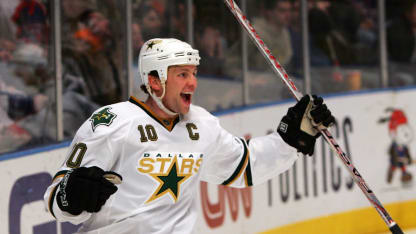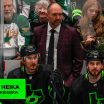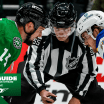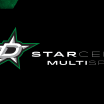He arrived in Texas as a wide-eyed kid from Saskatchewan more than a quarter of a century ago, and he never left.
Along the way, he played an unflinching brand of hockey that made him a fan favorite and earned him the captaincy of the Dallas Stars.
We caught up with Brenden Morrow a couple of days before he was to be feted at American Airlines Center prior to Saturday's game with the Carolina Hurricanes for a candid, wide-ranging chat about his time in Dallas.
The father of three -- a daughter, 13, and twins, a boy and a girl, who are 9 -- is a regular chauffeur to tennis lessons and matches, and is now a full-fledged hockey dad, as his son is playing his first year of travel, playing with the son of longtime friend and Stars teammate Marty Turco.
Q+A: Brenden Morrow reflects on time with Stars and what may be ahead
The former captain will be honored throughout Saturday's game as part of the team's 25th Anniversary Reunion Nights

© Jim McIsaac
Scott Burnside: Is being a hockey dad different than it was in your family growing up?
Brenden Morrow:"How would it be different? I think this is like 'A' travel it's not the 'AA' travel. I don't know if it's quite as competitive. The boys, if they lose a game, they go back to the hotel if there's a pool, they're playing tag. It's still that age where they're not sure exactly what happened. Right now, the second they walk out of that locker room, it's like it didn't happen. For better or worse, I'm not sure which."
SB: So, you're not coaching, just a hockey dad?
BM:"I'm still kind of trying to figure out exactly what I want to do. If I want to get committed to do that a little more, if I want to talk to the Stars again to get back involved with them, or if I want to go a completely different route. I'm still trying to figure all that out."
SB: Is being retired different than you thought?
BM:"When you're playing, unfortunately, you're really not thinking about the end, or that it's going to be done, or what you're going to do until it's too late. I don't know what my expectations were. There's I guess pros and cons on both of it. There are days where I'm enjoying it. I love what I'm doing -- I'm either playing golf or doing stuff with the kids. I love it. And then there's days when I feel like I'm wasting away, I need to be doing something -- I'm bored. I want to get back involved in something. It is a bit of a mental struggle to figure out what you're going to do when you're done."
SB: Morrow is involved in a couple of business interests he's pursuing but nothing that amounts to full-time work.
BM:"It's not what I envision doing long-term. I want to sink my teeth into something and really work. I think when I'm back involved doing something, it's going to be the same way I played hockey: it's going to be all-in, and kind of getting after it."
SB: Do you miss playing?
BM: "For sure, I miss it. I miss playing. And having this much time off ,the body feels really good. There were days at the end of my career I couldn't get my socks on in the morning. It was a struggle to bend over, just the lower-back pain that I was having. You couldn't train the same way. I couldn't have the power that I used to have, and that was always an advantage -- my strength, not my speed, so I needed the power and I couldn't train that way. But the speed of the game is so fast now and, over the past three years, the game has changed even more from when I was still playing. So, I know I can't compete at the level, so I think that helps me know I'm done. But yeah, I certainly miss it."
SB: You attended your draft in 1997 in Pittsburgh and met with the Stars beforehand and had a good feeling that maybe Dallas would call your name.
BM: "I had a really good -- I guess I wouldn't call it an interview-- but I had a really good talk, and I really enjoyed my time with Craig Button, who I think was the director of player personnel. So I had a good feeling, but you never know going into the draft. But I had a feeling that Dallas was almost like a family. They were honest. They said, 'We take our time with our guys. We put you in the minors, kind of like Jamie Langenbrunner, and look at the success he's having now.' And just really grow the talent instead of throwing them on the fire right away. They just felt like a family. It wasn't just an interview, we rode around in a car together and just had a really good conversation. When Dallas called my name, I was really excited. They had some high-end talent on that team, and then I think it was a year or two later, they ended up signing my hockey idol, Brett Hull, to a contract and I got to live out my dream and play in the NHL and do it with my hockey idol, and that was a pretty big deal."
SB: At the start of the 1999-2000, Morrow played nine games with the Stars' AHL franchise in Kalamazoo before he got called up to join the Stars. He never went back.
BM:"My first game, I remember the call -- I got it late, maybe 10, 11 o'clock (at night) -- and kind of the same story you hear, you had to rip around and pick up your equipment and catch an early morning flight, but by the time I called all my friends and family, I think I only slept an hour or two before I got on the plane to Philadelphia. I remember in warmup, it was just surreal. I really had to focus on passing the puck, because my hands were shaking and I was looking across the ice, and there was the 'Legion of Doom' over there (Eric Lindros, Michael Renberg and John LeClair). It was really cool. I remember everything of probably my first week in the NHL."
SB: What did you learn in those early days that helped prepare you for the rest of your career?
BM:"I think I learned from that veteran team how to win consistently and be a pro. We had a good, fun team. We went pretty hard, but they picked their spots on when they could have fun and enjoy each other and night life and when it was time to work and compete and win. Those were fun times. That's what I appreciate and remember most of those teams. It's very special, we're very lucky to be in the position we're in to play pro sports, but it's still a short window in your overall life and you've got to enjoy it. The more fun you have at it, the more success you're going to have at it and I think the longer your career is going to be. And we had a lot of fun."
SB: Morrow's rookie season included a trip to the Stanley Cup Final, where the Stars were defeated by New Jersey. He didn't get back to a Final until the last year of his career, 2015, when he was a member of the Tampa Bay Lightning. The Bolts were defeated by Chicago in six games.
BM: "You hear it from everyone, 'Hey, take advantage now, you never know when you'll be back here.' But at the time, you think we'll have it next year and we'll take our shot. I don't know if you remember back then (in 2000), I broke a bone in my ankle in the Colorado series (the Western Conference final) and I thought my playoffs were over. I didn't play for a game or two. I was in Colorado, and I was in a walking boot -- they didn't even have me fully casted and I wanted to play and I was showing the trainer and I got up on one leg and I was jumping up and down on one leg and I'm like look it doesn't hurt it doesn't hurt. I guess it wasn't a weight bearing bone. I put on a pair of (Mike) Modano's skates because we have the same size feet and I went out and I skated a couple of laps and they shipped in my equipment and I played the next night."
SB: A postscript to that story is that about seven or eight years later, that bone fragment had lodged itself in Morrow's ligament in the ankle and he had to have it cut out of the ligament.
What was it like to be given the captaincy, especially given your relationship with the man who previously wore the 'C' Mike Modano, with whom you were close friends?
BM:"Well, like you said, it is an honor. And Mike handled it incredibly. We had a great relationship. We worked out in the summertime together, and Mike was great about it and total class. But it wasn't how you'd envisioned it. You don't want to have it taken from somebody that you love and respect, and have it given to you. I think the move was going to be done whether I accepted it or not. I think Doug (Armstrong, the team's GM) wanted to go a different direction and have different leadership. So it wasn't a smooth transition, but for me, it was a great honor and Mike was the first person to congratulate me and tell me if I needed any help that he was there for me. He made things a lot easier than they may have been being the face of the franchise. He was very accepting of it with me. Not so much with management, but he was very accepting with me."
SB: Did you like being captain?
BM:"There's days you enjoy it and days you don't. There's a little extra responsibility. You're speaking on behalf of the team, a lot of the times. I don't think I was ever fully comfortable with being the guy that had to do the speech. I was kind of the action guy. I'd rather go out and do something and have somebody follow me and I think that's kind of how or what Doug saw in my play that was maybe infectious, and hoped I'd maybe grow into more comfort in doing the talking. But I didn't want to change either just because I was the captain. I didn't want to change what made me 'me.' I did have to do some speaking that I didn't love and I don't like the center of the stage, I like to be the guy in the background. So there were things I wasn't comfortable with. I think Jamie (current Stars captain Jamie Benn) is a little bit that way, that's why I'm so impressed with him now. Seeing how comfortable he is being that guy, being the guy up front and taking center stage, I can't say enough about him because he was a bit of a shy guy coming in and he's grown into a man who can handle that."
SB: You obviously played for Ken Hitchcock in your early years in Dallas. Is it weird seeing him behind the bench again?
BM:"I wouldn't say it's weird. It's almost comforting because I know what expectations are from him, and I believe that is what that team needed to improve and, hopefully, get over the hump."
SB: Do you have a favorite Hitchcock memory?
BM: "One of the first things that probably helped me. I came off what I thought was a really good rookie season (33 points in 64 games). I had my year-end meeting with Hitch and was expecting almost a thank you from him. And I left the meeting and it was basically go home, work hard and we'll see if we can find a spot for you next year. And I was like, 'Holy (crap).' So that's how things are going to be. You know what? It scared me. I went home, and I worked hard and the rest is history and I had my place on the team. But it showed me you're only as good as your last game and work hard and be a pro and don't expect anything from me because of your year, this year. You've got to go home and work hard."
SB: You've been married to your wife, Anne-Marie, for 15 years, and normally, we wouldn't be pressing you for details about your personal life, but your relationship is a little bit different in that Anne-Marie is the daughter of your former teammate, Guy Carbonneau. That must have been, well, different.
BM:"Honestly, he doesn't get a chance for a rebuttal, but I will tell my version of it. You know, I'm from a small town of 900 people in Saskatchewan, but I know better than to mess around with a teammate's daughter."
SB: But Anne-Marie would occasionally show up at team functions and Carbonneau would sometimes make sure Morrow knew if his daughter was going to be around and the two would talk, and after a time, teammates began giving him the gears about his interest in Carbonneau's daughter.
BM:"But I always was respectful, and I wasn't going to go down that path, because I really enjoyed playing on the team."
SB: Yet as time went on, it was clear that it was okay if they saw each other socially, and Morrow wouldn't get sent to minors.
BM:"I didn't ask him, 'Hey, can I take your daughter out?' But I think it was known by everyone he was okay with it. But what happened was, we're playing in the Stanley Cup Final, and it almost became a bigger story and that was what was unfortunate. It actually hit the news because when I was not playing in the Colorado series with my ankle, I was sitting in the stands and they came and interviewed me with her sitting next to me. It turned into a bigger, bigger story and grew, and then Hitch called the two of us into his office (Carbonneau and Morrow) and said 'Hey, do we have a problem here, and Brenden, what the hell is going on? And we were both like, 'No, Hitch, this is totally fine. We're both okay with it."
SB: Morrow has a terrific relationship with his father-in-law, but make no mistake, there's still some separation between home and hockey when it comes to Anne-Marie's hockey acumen.
BM:"Just because she grew up around hockey; that girl still doesn't know what icing is."
SB: Does it seem strange to you that Texas has become home for you, that you've put down such deep roots?
BM: "I feel for me and my personality, I was really lucky to play in a market like this and have fans like this. This is a really special place. The neighborhood I live in, the southern hospitality, how polite everyone is, I love and I feel like I was very lucky and blessed to be a part of this team, this organization, this city, and this is home and I don't see our family ever leaving."
Brenden Morrow returns to American Airlines Center on Saturday, where he will be honored throughout the Stars' game against Carolina as part of the team's 25th Anniversary Reunion Nights. For more information, and to purchase tickets, click here.
This story was not subject to approval of the National Hockey League or Dallas Stars Hockey Club. You can follow Scott on Twitter @OvertimeScottB, and listen to his Burnside Chats podcast here.


















